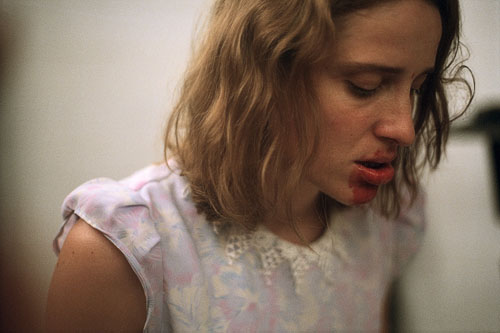A man and two women sit in a bathroom learning vocabulary words from an old-fashioned tape recorder. The tape informs them that a sea is an old leather armchair, a motorway is a strong wind and an excursion is a durable material.
Freakish family folklore

A man and two women sit in a bathroom learning vocabulary words from an old-fashioned tape recorder. The tape informs them that a sea is an old leather armchair, a motorway is a strong wind and an excursion is a durable material.
One of the women suggests they play a game: Who can stick their finger under a hot faucet longest. This is how Yorgos Lanthimos’ 2009 film Dogtooth pulls you into its wonderfully twisted world.
I happened to see Dogtooth on a whim last year based solely on its intriguing premise: A husband and wife shelter their three adult children from the outside world, teaching them that airplanes are merely toys and stray cats are fearsome creatures.
The film is showing at 5th Avenue Cinema this weekend, and I cannot say enough to recommend it. Dogtooth is subversive, surreal and incredibly clever—and it’s also very entertaining.
The father and mother, played by Christos Stergioglou and Michelle Valley, respectively, have planned out the fantasy existence of their three children in a fenced compound to the smallest detail. The father works at a factory by day, and pays a coworker named Christina (Anna Kalaitzidou) to be driven blindfolded to his home to have sex with his son in order to satisfy his adult male urges.
Christina is the only character in the film with a name. When she starts to barter with the elder daughter (Aggeliki Papoulia) for more fulfilling sexual favors—which the daughter doesn’t begin to understand the significance of—Christina unwittingly lets the family’s bizarre home life become tainted by the outside world.
Lathimos offers a scathing critique of parents who homeschool and otherwise shelter their children, but this film has also been interpreted as a satirical look at everything from government to pop culture.
When the elder daughter gets her hands on Christina’s Jaws and Rocky IV videotapes, the father reacts with horrifying rage, cursing Christina’s future children.
“I hope your kids have bad influences and develop a bad personality,” he says. “I wish this with all my heart.” Many scenes can be viewed as ridiculously comedic, the blackest of black humor, but this is not one of them.
In Dogtooth, sex and violence are presented as natural instincts, which can often be shocking, even if you’re not easily jarred by movies. Lanthimos really plays with the idea of nature versus nurture and the moral constructs of society.
Clearly, these three siblings are repressed, though it just might be a different kind of repression from what society normally imposes.
Stergioglou’s character considers movies and pop culture bad influences, and his propensity for violence and his obligation to fulfill his son’s sexual desire lead to far more perverse results than quoting Rocky. That is, of course, the irony.
The title Dogtooth comes from the parents’ lesson that children are only ready to leave their home when they’ve lost a dogtooth—which, of course, will never occur naturally. The film ultimately becomes about Papoulia’s character, and her urge to rebel against her father and her brother gives the story a feminist dimension as well.
At times, Dogtooth seems to be attacking the world from all angles, throwing into question what we should teach children as well as what we inevitably teach them, the problems with society and the problems with human nature. It dissects the difference between the meanings we assign to things and what they actually mean—the importance we assign meaningless things versus what actually matters.
Dogtooth’s ambiguous ending should be left unspoiled, but there is no grand man-behind-the-curtain moment. The world outside the compound is very minimally represented, and while the elder daughter does go through changes, they are subtle and sometimes unexplainable.
Dogtooth
510 SW Hall St.
Friday, May 31, and Saturday, June 1, at 7 p.m. and 9:30 p.m.
Sunday, June 2, at 3 p.m.
$3 general admission, free for students
She isn’t so much questioning the validity of this elaborate, almost science-fiction-like reality her parents have created, it’s just that something inside her wants more than to be imprisoned, to be parented, to be forced to do things she doesn’t want to do. You can see why some critics have called this film a satire on totalitarianism. It would be nice to think that all human beings have similar instincts.
Dogtooth won a host of festival awards, including the Prix Un Certain Regard at Cannes in 2009. It was also nominated for Best Foreign Language Film at the Oscars, where it competed against another recent 5th Avenue Cinema selection, Biutiful.
Greece was apparently very proud of it, and the Greek prime minister praised the film for representing a new generation of Greek artists.
In the end, Dogtooth is most significant because it can be read in so many different ways. But whatever you draw from the story, I can guarantee that, no matter how hard it is to shock you, you’ll be thinking about Dogtooth for a very long time.






